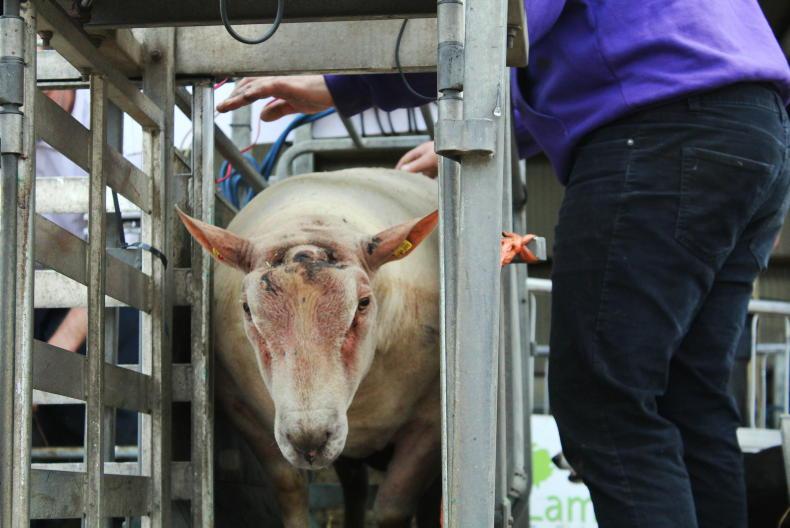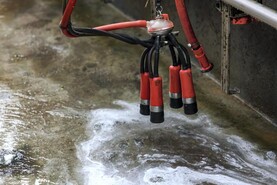The heightened risk of the bluetongue virus reaching our shores and the damaging consequences of such an outcome materialising, has cast a spotlight on the rules governing the importation or export of breeding sheep. With this in mind, the Irish Farmers Journal asked the Department of Agriculture for the latest rules and regulations governing such movements. A spokesperson for the Department has outlined rules for sheep moving to and from Northern Ireland, EU member states and Britain.
Movements from Northern Ireland
Breeding Sheep certified for movement from Northern Ireland must meet the health requirements of the Intra-Trade Animal Health Certificate (Model OVI/CAP-INTRA-X).
The sheep must have been resident on the establishment of origin for a period of 30 days pre-movement. During this time, they must have not been in contact with kept ovine or caprine animals of a lower health status. They must also have not been in direct or indirect contact with kept animals that have entered the European Union from a third country within this period.
They must be identified with a full electronic identifier (EID) tag set, or an electronic bolus set. If an electronic bolus is used, the sheep must also be tagged with a blue conventional ear tag. This indicates that the sheep is electronically identified by the bolus. The sheep do not require retagging on arrival at the new holding.
All uncastrated male sheep must have a negative blood test for ovine epididymitis (brucella ovis). They must come from establishments in which the disease has not been reported during the last 12 months prior to the date of departure. There are no bluetongue virus (BTV) testing requirements, as Northern Ireland and Ireland are currently free of BTV. The breeding sheep must come from a Scrapie-monitored flock or have the necessary genotype testing result (ARR/ARR prion protein genotype in the case of breeding sheep).
There is no compulsory bluetongue or maedi visna post-movement testing of breeding sheep moved from Northern Ireland.
The sheep must be checked for clinical signs or symptoms of diseases by an official veterinarian within the last 24 hours prior to the time of departure. The sheep must meet all of the requirements of the accompanying veterinary health certificate which must be completed and signed by an official veterinarian.
Movements to other EU member states and Northern Ireland
Breeding Sheep certified for movement to Northern Ireland, must meet the health requirements of the Intra-Trade Animal Health Certificate (Model OVI/CAP-INTRA-X).
The sheep must have been resident on the establishment of origin for a period of 30 days pre-movement. During this time, they must have not been in contact with kept ovine or caprine animals of a lower health status. They must also have not been in direct or indirect contact with kept animals that have entered the European Union from a third country within this period.
They must be identified with a full electronic identifier (EID) tag set, or an electronic bolus set. If an electronic bolus is used, it must be accompanied by a blue conventional ear tag. This indicates that the sheep is electronically identified by the bolus. All uncastrated male sheep must have a negative blood test for ovine epididymitis (brucella ovis).
They must come from establishments in which the disease has not been reported during the last 12 months prior to the date of departure. There are no bluetongue virus (BTV) testing requirements, as Northern Ireland and Ireland are currently free of BTV.
The breeding sheep must either come from a scrapie monitored flock or have the necessary genotype testing result (ARR/ARR prion protein genotype in the case of breeding sheep).
The sheep must be checked for clinical signs or symptoms of diseases by an official veterinarian within the last 24 hours prior to the time of departure. The sheep must meet all of the requirements of the accompanying veterinary health certificate which must be completed and signed by an official veterinarian.
Breeding sheep movements from EU member states
The sheep must have been resident on the establishment of origin for a period of 30 days pre-movement. During this time, they must have not been in contact with kept ovine or caprine animals of a lower health status.
They must also have not been in direct or indirect contact with kept animals that have entered the European Union from a third country.
Sheep originating from an EU member state must already be electronically identified with a full electronic identifier (EID) tag set or an electronic bolus set and must not be re-tagged on arrival at the new holding.
All uncastrated male sheep must have a negative blood test for ovine epididymitis (brucella ovis). They must come from establishments in which the disease has not been reported during the last 12 months prior to the date of departure.
The breeding sheep must either come from a scrapie monitored flock or have the necessary genotype testing result (ARR/ARR prion protein genotype in the case of breeding sheep).
The sheep must be checked for clinical signs or symptoms of diseases by an official veterinarian within the last 24 hours prior to the time of departure. The sheep must meet all of the requirements of the accompanying veterinary health certificate, which must be completed and signed by an official veterinarian.
Movement of breeding sheep from a member state with a confirmed presence of bluetongue virus (BTV) is subject to additional measures, such as extended quarantine, vaccination against the disease and serological testing of the animals. Those purchasing breeding sheep in these member states should satisfy themselves in advance that the breeding sheep can fulfil the additional measures required.
Questions in relation to the ability of the sheep to meet the terms of the certificate should be addressed to the member state which is certifying the animals in the first instance. If the animals arrive and are found not to have fulfilled the certificate requirements, they will be disposed of at the owner’s expense.
Post-entry sampling requirements for live ruminants into Ireland is undertaken to check for the presence of bluetongue and other diseases, including epizootic haemorrhagic disease. It is important that all animals tested remain isolated and confined indoors (away from all susceptible species in the herd/flock), until the blood testing results are satisfactory.
Import requirements for breeding sheep from Great Britain:
The import of bluetongue-susceptible animals, including breeding sheep, from Great Britain to Ireland has been suspended since November 2023 due to the spread of the disease there.
Therefore, importation of breeding sheep from Great Britain is not currently possible.
Export requirements for breeding sheep to Great Britain:
Breeding sheep certified for export to Great Britain must meet the health requirements of the GB Health Certificate GBHC630.
The sheep must have been resident at the establishment of origin for a period of 40 days pre-movement. During this time, they must have not been in contact with kept ovine or caprine animals of a lower health status.
They must also have not been in direct or indirect contact with kept animals that have entered the European Union from a third country within this period.
All sheep must be identified with an electronic tag set or an electronic bolus set prior to leaving the establishment of origin. If an electronic bolus is used, it must be accompanied by a blue conventional ear tag.
All uncastrated male animals must have a negative blood test for ovine epididymitis (brucella ovis). They must come from establishments in which the disease has not been reported during the last 12 months prior to the date of departure.
Ireland is currently free of Bluetongue Virus (BTV), therefore there are currently no pre-movement testing, vaccination or quarantine requirements in relation to the disease.
The breeding sheep must come from a scrapie monitored flock or have the necessary genotype testing result (ARR/ARR prion protein genotype in the case of breeding sheep).
Sheep consigned to Britain may be dispatched from their holding of origin, without passing through any market, either directly to Great Britain or to an officially authorised assembly centre.
The sheep must be checked for clinical signs or symptoms of diseases by an official veterinarian within the last 24 hours prior to the time of departure.
The sheep must meet all of the requirements of the accompanying veterinary health certificate, which must be completed and signed by an official veterinarian.






 This is a subscriber-only article
This is a subscriber-only article










SHARING OPTIONS: